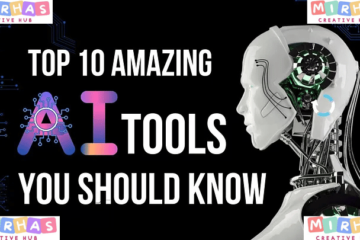Through Changing Job Markets: The Future of Work Through AI

The surge in AI technology across the globe is fastly influencing the job market in a significant way. Businesses, their operations, how the employees perform their jobs and the variety of jobs available are all propelling into the new direction. Nonetheless, there remains an equally compelling argument in regards to how work in general, including fewer jobs, re–training, etc., will evolve as the use of AI will increase since productivity will graph will look differently.
In the current era of transformation, this paper will focus on how AI is changing the job market, what new possibilities and threats AI generates, and what should employees and employers do in such times.
Artificial Intelligence and Robotics

Job Automation and the the Future
AI is affecting the job market in a variety of different ways, one of which is automating jobs. The replacement of human workforce with AI systems or robots to perform tasks has rendered many jobs of the workforce obsolete. The result is many manual and clerical jobs in different sectors are ever so increasingly being automated.
Let us consider the impact of innovations devoid of human intervention in their execution. Most automation has transformed the way businesses seek to eliminate the manufacturing tasks performed by human beings, however, some advancement in robotics has also facilitated the elimination of mundane duties performed by employees. AI driven cars replacing taxi drivers would fit in this narrative as well exacerbates assortment of activities within the transportation industry. In essence this encapsulates AI’s immediate effects on jobs pertaining to the varied sectors of transportation, warehousing, and assembling where AI seeks to eliminate tasks performed by human beings.
Even so AI also seeks to recruit boy AI specific positions that fall exactly within its domain, some early examples include professionals in areas AI, Data Science, Machine Learning, Robotics getting hold of AI functional positions. Such jobs have on the other hand emerged as AI systems were not created in yester, whereas, with this new emerging technology becoming increasingly predominant, these jobs are crucial and central in the functioning of the entire AI systems.
The concept of employment gets altered with AI in terms of job demolition and resurrection. There persists a widespread trepidation regarding AI’s fallout at the workplace. Several reports seek to attribute this prediction, particularly, the 2023 report by the World Economic Forum, which conveys that as many as millions of job opportunities would stand nullified due to AI and automation by the futuristic timeline. Nevertheless, the issue of new job creation is not exactly whimsical, but rather the issue is who would possess the requisite skills and whether the individual is competent enough to use such degree of skills.
In the context of the AI century, every organization will need to take into account re-skilling and up-skilling workers in order to avoid job displacement because of automation. New skilled resources will need to be integrated globally to address the shifting workforce landscape created by AI and automation. This will extend to working with people because innovation, emotions or even logical thinking – skills to be automated or replaced – will have to be quite reliable.
The AI wall is now built up from a brick by brick by various governments, organizations and even educational institutions so that each worker hand getting affected due to the shift does it smoothly. Coding camps, free internships, programs, paid internships, mentorship classes offered by organizations as well as many other programs are redefining the narrative toward orientation that is a must in the advancing AI economy.
AI and The Future of Global Economy—Increase in Remote Working Class
Which other area do I believe AI technology makes progress? I would say management and eventually, expansion of remote working population. With the proliferation of virtual meeting applications, cloud based suites for project management, and self communication particularly if it is bots who do the liaising, such teams become geographically dispersed and multi time zone ready.
Allowed to work from home, the employees now have access to work opportunities from any part of the globe which indeed increases the range of talent for the employer. Therefore, with a single marketplace, businesses can now search for a wider range of teams since they can look for the right skills without needing to be based in a particular area.
Making remote teams work is also easier with the help of AI tools. For example, AI-based project management aids in task distribution, progress monitoring, and even recognizing barriers with the right information at the right time. In the same vein, AI-based chat bots and AI-assisted virtual assistants are able to accomplish standard office procedures and administration which allows staff to redirect their energies to more productive activities.
AI Deciding Better For And With Humans: Mitigating Human Effort
Yes, I fully agree that AI will carry out numerous tedious tasks, but it will by no means usurp the human decision-making office. Rather, AI indeed seems to be augmenting the human aspect by bringing out perspectives from data that allows the worker to make optimal decisions.
For instance, AI analytics provides businesses with tools to gain insight on customer preferences, market trends and also to enhance their internal structures. The adoption of AI technology can also assist in locating customers indiscriminately from increasing the size of the business seeking and determining trends in the market that are impossible for humans to do.
For example in the area of medicine, AI has started to be deployed in assisting the diagnosis of various diseases, and the treatment of patients. In addition, AI has also been adopted by clinicians and other health practitioners to enhance the quality of decision-making and the end results of their patients. So also in it finance, AI based assets assist analysts to locate meaningful relationships or even mitigate risks.
The skill set required to complete a given job is changing. One does not just have to execute a job, but one is now required to understand the role and incorporate AI when necessary. Here, AI compliments human capabilities.
AI and the Change in the Job Market: New Opportunities and New Sectors

However, the anxiety regarding the threat of unemployment is undoubtedly real yet depending on what context AI is deployed, there is emergence of new jobs too. As AI progressively gets embedded into the weeds of organizations, there are new roles which never existed before, and the existing roles are changing ‘their’ forms. Such a scenario can arise which requires working directly with AI agents or AI technology to perform tasks in various sectors.
For example, AI research has led to the emergence of such positions as: AI Ethics and Policy Experts Hiring: With the growth and increase of interest in AI, there is a growing need for specialists who will develop a technology and use its regulation where compliance with AI, ethics, and Data Protection is the focus. AI Trainers: Such systems shift the learning and development responsibility to humans, aptly called AI Trainers, who provide the feedback required on what algorithms and practices to follow for AI models to be not just effective but also reliable. Human – AI Interaction – These professionals are required to construct the system interfaces for interaction with AI, which will be increasingly needed so that it does not require any explanation to use. These roles are interdisciplinary and involve both machines and humans. AI Support and Services: This occurs only in AI systems maintenance and support because usually, like any other technology, AI has some troubleshooting, maintenance, and optimization of the system. These advancements help us analyze the employment landscape in a time when artificial intelligence is prevalent. Those who are getting used to the process of acquiring knowledge and evolving will have much more space to develop since the clouds of opportunities are beginning to take shape.
AI and its Impact on Employment: An Ethical Dilemma
But above all, when AI is integrated across the board, fairness, bias, and transparency might be critically compromised. Analytics will not transform how we do business if every decision is made based on datasets that include hate, prejudice, and discrimination because AI depends heavily on creating datasets and these datasets are, in turn, created through incorporating hate, discrimination, etc. Do the AI based systems improve anything that does not already exist? Such unjust practices will be witnessed in hiring, selection, and promotions as well as every employee action.
AI powered recruitment which claims to help employers fill vacant positions across the globe, seems to be the new trend that is gaining momentum in different sectors. However, if the data used to train these tools contains contempt for particular groups, AI could also be biased against those groups. Besides, in order to overcome such operational limitations, businesses will need to ensure that AI systems are capable of being verified to be free of bias and fairly operated, without constant discrimination.
Robotics, while claiming to reduce the cost of doing business and the employment of individuals, raises ethical questions too. As many jobs are automated, many employees are most probably going to lose their jobs. That is why it is important for the companies and countries where the companies operate to enable protection mechanisms where employees may not lose their jobs and there will be gradual change in the economy which is AI driven.
Conclusion: The Future Work Based On Usign AI Machines
There is a significant burden placed upon automation and it certainly connects well with AI work. Manifold changes across all societies are likely to occur in the coming days causing revolution in the world of work. True it is that certain job categories may not exist at all due to the evolution of technologies like AI but more advanced forms of skills, better reasoning, and cognitive interactions machine-human will emerge.
Education for alternative jobs, promotion to higher positions and roles to construct AI may, hopefully, assist in tackling the problems concerning use of AI comprehensively. All three, the businesses, workers and the government would have to develop policies on how they can leverage the use of AI to be more optimal, more flexible and more beneficial to the labor market as a whole.
Considering the manner in which the world is evolving, one should not be afraid of AI integration, rather it is something that should be embraced. Provided that appropriate policies and strategies are put in place, the workforce will be able to focus on more sophisticated and enhanced AI systems.



0 Comments